
"Why is it so hard to lead a simple life?"
I went into Scent of Time without reading the synopsis. I was more than a little trepidatious when I discovered in the first episode that it involved time travel. The Chinese government’s rule against hopping through time meant that it wasn’t going to really be a true time travel so I braced myself. That’s not a spoiler, that’s the sad fact with the current state of affairs. How the writers worked with and around the regulations would determine how satisfying it would be.Hua Qian has made some poor choices along with her family that has led to the deaths of nearly everyone close to her. As she collapses after being captured, she hears a voice asking, “If you had the chance to start over, would you change anything?” She says yes and awakens 2 years prior on her wedding night. From that moment on she endeavors to be a good person and to find a way to save her family and herself. She’s helped on her quest by her right-hand woman Qian Zhi, bodyguard Hua Rong Zhou, and the lord of an incense empire-Zhong Xi Wu. The damage to others from years of conniving behavior will have to be undone with few people willing to give her a second chance.
I thought this was an interesting take on a typical romance and historical drama. The scheming 2FL from the original story was given a redemption arc and the chance to put things right. Hua Qian methodically planned to save not only her family but also that of her rival’s, Mu Yao. After two years struggling to survive, she came back with new skill sets and sympathy to those in lower social positions. Because of her new life or death goals, romance was not on her list of things to do. That didn’t keep at least two men from falling for her---hard.
Zhou Ye brought a wide range of emotions to Hua Qian as the reformed selfish social climber. Wang Xing Yue also made the most of his portrayal of Zhong Xi Wu. The two had great chemistry even though Qian’s responses let him know she was aware any chance of them ever being together was remote given the social circumstances which kept her at a distance. Peng Chu Yue’s Zhong Ye Lan and Zhang Yi Jie’s Hua Rong Zhou were rather flat, both the acting and the characters. Zhao Qing didn’t create any depth to Mu Yao either. Zhou Ye, Wang Xing Yue, and the older cast provided the acting chops for this drama.
It took around 8 or 9 episodes for this drama to sink its teeth into me and once it did, I was hooked. Scent of Time was addictive even without much overt romance. I do love redemption stories and Qian was a young woman for whom suffering and loss became harsh but invaluable teachers. The ending I feared would “incense” me due to censor restrictions turned out to be tolerable.* (Thoughts on ending and TROP connection below) This drama may not have been “scent-sational” but it was entertaining.
21 July 2024
**********************
Spoilers for Scent of Time and The Rise of Phoenixes
Hua Qian and Hua Rong Zhou’s relationship felt a little like TROP fan fic if Feng Zhi Wei and her bodyguard Gu Nan Yi had developed a relationship. Zhong Xi Wu had the same, “the business/country comes first” platitude that Ni Ying had which was detrimental to relationships. ZXW became rather overbearing in the rerun life near the end as well. Story-wise, Hua Qian should probably have ended up with Rong Zhou and stayed in the alternate timeline with him or had him available to go out into the vast world and start over with when she woke up. Overall, those writing choices would have made better narrative sense. Chemistry-wise Qian and ZXW had way more chemistry though not enough scenes with her showing she cared if they were truly endgame. By having her awake from the coma, she had to deal with the consequences of her actions which was decidedly painful but more realistic. Though it did make the prior 29 episodes feel irrelevant. I suppose the rerun life gave her life training lessons on how to be a better person. And realistic is a relative word, without feeding tubes and IV’s Qian would not have survived 26 months in a coma. The esophagus closes when a person is unconscious, making force feeding impossible. Despite logical and narrative lapses, I “whiffed” through this drama and its tantalizing “bouquet.”
Cet avis était-il utile?

Powerful and inspiring short film
Beautiful Run was a powerful and deeply touching short film. I have watched it twice and cried twice-something quite unusual for me. I’m not sure how realistic it would be, but I hope with all my heart it could be.A young girl with a disabled leg who uses crutches cares for her bedridden father often missing school. Short on food and medication she applies for the most menial of jobs but is rudely turned down as people glance at her leg. She happens upon a flyer for a marathon with a cash reward and enters it. At first, she receives the same disdainful side-ways glances from the other runners, but during the arduous journey as she determinedly perseveres with one leg, her efforts begin to change the hearts of the other runners.
At less than seven minutes long the story is told with almost no dialogue. Only the careful editing and expressions on people’s faces tells the story. Near the end there is clarification through group messaging, but other than that everyone is silent. The music also nurtures the audience’s feelings. The nameless young woman never complains, never breaks down in tears, she just relentlessly keeps moving forward with her committed resolve.
This girl’s selfless persistence in a grueling physical act of love broke through people’s prejudices and began to bring out the best in others. The film stopped short of being patronizing. Beautiful Run made me believe that good does exist and people can open their minds and hearts to others. “Gratitude makes the impossible happen.” Let it be so.
10 June 2024
Cet avis était-il utile?
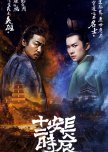
Le Jour le plus long à Chang'an
8 personnes ont trouvé cette critique utile
Hidden Motives, Crouching Fire
The Longest Day in Chang’an is a drama that can make you rave and rage. The production values were excellent, building a world that seemed real. For the most part the acting was also above average. What was rage worthy were all the characters from the ruling class that lied, cheated, stole, tortured, and murdered to move up or keep their vaunted positions. Completely out of touch with the people’s reality, the more they talked about the great Tang or serving the people, the more they ignored the truth, often seeking to find scapegoats for any problems that arose.“Humans have always acted differently than their words”
The basic template was simple. Bad guys were in town to cause problems and the Crown Prince was about to be passed over for the Right Chancellor. Li Bi, a young prodigy, headed up the Peacekeepers Corp which had a database of information to draw from. The database picked death row inmate, Zhang Xiao Jing, to solve their problems. All he had to do was track down the bad guys and round them up before the Emperor’s giant lantern is lit at 2:00am on the night of the Lantern Fest and make the Crown Prince look good in the process. This being a drama filled with political intrigue, nothing was that simple when everyone was vying for position and trying to be on the winning side, especially when being on the losing side of power could mean death. Much of the action also occurred because of a military squad’s loyalty and near annihilation due to bad military management ten years prior.
“Kindness must be repaid, vengeance must be served”
Ex-soldier and ex-Sleuth Hound Commander, Zhang Xiao Jing , was a hardened warrior who was completely devoted to the surviving 9 from a disastrous military campaign and the daughter of their leader. He also held to the dream of what Chang’an could be for all people and would fight to protect the commoners with his last breath. Lei Jia Yin gave a strong, if not varied, performance as the super fighter who seemed to always be fighting large numbers or having to sacrifice to gain information. I was curious how a prisoner confined in a tiny cage for months would have had the stamina to run across Chang’an over and over all day and night as well as fighting almost non-stop.
“If I can’t save the present, I can’t save the future”
Jackson Yee as Li Bi, was more limited in his range as the leader of the Corps who found that despite his intelligence, he was often outplayed by people outside of and within the Peacekeepers. Rayzha Alimjan as Li Bi’s servant, Tan Qi, at least gave a strong female presence in a largely male cast. I was surprised and pleased to see Djimon Hounsou in the role of the Underworld Lord. Feng Jia Yi played the much older and retired on duty Emperor, with his white beard and eyebrows reminding me of Lo Lieh’s iconic character from Clan of the White Lotus. The most mesmerizing performance, however, was from Zhou Yi Wei as Long Bo. His every move was captivating in a nuanced and menacing performance that in lesser hands could have been ham-fisted.
“Numbers are the truth”
How many times did someone pull out mint to chew on? I stopped counting at 17 times. How many times was Zhang accused of being the perpetrator of a crime? Around 1,756, 230. The Emperor has indigestion. Dang that Zhan Xiao Jing! How many times did someone promise protection and then renege on it? The odds were not good for the person being promised. Pinky swears didn’t count for anything in Chang’an. How many characters did I wish would erupt into flames, but didn’t? Around 10. “A good man will be rewarded” or blamed by the bad man who will then be rewarded in his place. How many times were the good guys captured? Let me pull out my calculator.
“Truth doesn’t matter as much”
What Longest Day in Chang’an did well was world building. The excellent sets, teeming streets of extras, and costumes that looked worse for wear as the day went on, transported me back in time. The multi-layered narrative, intriguing characters, and well-choreographed action scenes were engrossing. Again, Zhou’s Long Bo was captivating and Zhang’s dogged determination was admirable if not exhausting. Where it didn’t work as well was when it became bogged down in the details and desire to give small history lessons. By giving many minor characters important screen time it side-lined others. Certain elements also became redundant. And a character that was talked about often, the Crown Prince, had relatively little screen time making it hard to tell if all the hearsay stories about him were true. Whereas, the despicable Right Chancellor's every loathsome move was shown. Despite focusing on numerous characters, the big reveal at the end was rather anti-climactic as the “mastermind” divulged pages of exposition regarding his evil plan in order for it to make sense and even then left a golden clue dangling.
“Human beings need to hold onto some kind of dream. That is what will drive them forward.”
Zhang and his buddy Wen, both knew Chang’an was not an ideal place, but both hoped it could be. There were people who fought to protect the citizens, even a Catholic priest who could do parkour! The suffering was largely due to the corrupt political system. The royalty and officials constantly looked for a way to destroy their rivals and rise in power with little thought for anyone else. Commoners, soldiers and servants were expendable and interchangeable. Even the terrorists who desired to set the system on fire had no compassion for those who struggled to make a life and living in Chang’an. The Longest Day in Chang’an was gripping and well worth the time even when I was ready for the day to end.
17 January 2024
Cet avis était-il utile?
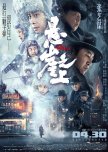
Cette critique peut contenir des spoilers
"Everything will be fine when the sun rises"
From the moment you see four white circles dancing over frosted tree tops you know you are watching a master at work. Director Zhang Yi Mou takes on the spy genre with the grace and flare he has refined over the decades.Four Chinese spies trained in the USSR drop into Japanese controlled Manchuria to rescue an escaped prisoner of the dreaded Beiyinhe camp, where prisoners were tortured, experimented on and killed. They want him to tell his story so that the world will know what is going on in those devilish camps. Unfortunately, from the moment they hit the snow covered ground and split up they find themselves in even greater danger because a traitor has revealed their mission to the enemy.
Xiang Chen partners with Lan as Team 1, while his wife, Yu, and Lan's lover Chu Liang form Team 2. Both teams run into subterfuge and lies dipped in murderous intent. The pace of the film moves ever forward with enough chases through the snow on foot, in trains, and in automobiles to keep things exciting. It's often a cat and mouse and cat and mole frantic affair. The script took a sentimental turn at the end, which frankly, I enjoyed because I'm a big softie at heart, even when watching a spy film. That's not to say there wasn't violence, fair warning for the squeamish, there were some utterly brutal torture scenes and deaths.
Zhang Yi Mou took a flawed script and made it gripping as each of the team members had to get by on their wits as well as their training. His trademark stunning shots and framing were in effect in every scene. This truly looked like a frigid world, emotionally and physically. The Republican Era costumes were sharp and spy approved black with plenty of Fedoras and fur-lined coats. Cho Young Wuk's music perfectly fit the scenes regardless of the mood. The closing song's melody was hauntingly beautiful. As a whole the film was stunningly put together.
Zhang Yi as the team leader did an admirable job playing the skilled and stoic spy. Yu He Wei as Zhou, the man dangerously straddling two worlds had me rooting for him and hoping I wasn't wrong. Unlike many Zhang Yi Mou films, the women's roles seemed less well defined though the two female spies held their own as they struggled to find a way out of the traps they were in.
Cliff Walkers wasn't a perfect film but I found it engaging nonetheless and a treat for the eyes and ears. Zhang Yi Mou has run afoul of the censors before so hopefully, this more patriotic film will give him more room to work in future endeavors. Having said that, he kept the political propaganda to a minimum focusing more on the individuals, their strategies to overcome the terrible odds and sacrifices that had to be made. I found it to be a well made spy thriller and worth checking out, especially if you enjoy this director's works.
9/24/22
Cet avis était-il utile?

The Thousand Faces of Dunjia
8 personnes ont trouvé cette critique utile
This movie felt like a Frankenstein's monster of movie ideas that the writer even lost track of-flying guillotines (1975 movie), a compass that doesn't point north (Pirates of the Caribbean), Fire Benders and Water Benders, a Tiger Gargoyle(?), and as always in these types of movies there's a glowing orb of destiny. Finally, I honestly thought at one point they might quote, "One ring to rule them all and in the darkness bind them." (LOTR) Making everything more confusing because of new censor requirements the writer had to do some writing gymnastics to not use mythological characters making the monsters wanting to take over the world aliens instead. This movie included a lot of CGI characters. There might have been a love triangle or square but that was also not made clear.
The cast was very likeable and did a good job with what they had to work with. Ridiculous as it seems, I enjoyed the ride they took me on even if I didn't understand it half the time. Fortunately, the movie focused more on the human characters than on the creatures. The story all boiled down to the old end of the world ploy that the band of heroes had to find a way to divert. Not a great movie by any stretch of the imagination but not completely worthless in terms of entertainment value either.
Cet avis était-il utile?

She Brought Colour into My World
9 personnes ont trouvé cette critique utile
Cette critique peut contenir des spoilers
How to write a review on a 3-minute short movie? Make it short as well and hopefully meet the MDL word requirement. She Brought Colour into My World pushed the boundaries of censorship with this story of love and friendship between two women. A lovely young woman resides in a world of stony black and white. The new neighbor has just returned from studying abroad wearing an ethereal white dress. Dressed in beautiful clothes both traditional and Western, the two neighbors meet and have an instant rapport and the young woman's world is filled with color. The woman in white regales her with stories from outside the walls and gives her a gift. They explore the city, dance and hold hands. In 3 minutes a whole relationship blossoms free from censorship or at least for a while and a choice must be made. Stay in the world of color or return as before to cold stone.
I enjoyed this short film that pushed the boundaries with its open subtext and told how love can bring color into our lives and just as easily take it away.
29 January 2024
Cet avis était-il utile?

Will someone please think of the children!
When your introduction to a movie is a mad scientist and then an alligator wandering in the ruins of the city, you know you are in for a wild ride. Badland Hunters won’t be remembered for its riveting plot but when you have Ma Dong Seok swinging his mighty fists and a giant serrated machete it really doesn’t matter.Three years after an earthquake that leveled Korea, Nam San along with teenagers Choi Ji Wan and Su Na live in an encampment called the Bus District. Due to a devastating drought, water is the most precious commodity. Nam San and Ji Wan are hunters for the people. They trade meat for whatever their neighbors can spare. A well-dressed group comes to the encampment looking for teenagers. The newcomers promise Su Na and her grandmother all the fresh water they can drink, shelter, and food at the only apartment complex to survive the quake. In a dystopian future when armed men come promising “heaven on earth”, best to be suspicious. It doesn’t take long for everyone to realize that heaven is not all it seems to be when a mad scientist is running the place. Nam San was ready bring hell to the complex to rescue Su Na.
It would have been nice to have some background info on our main characters, but in this sort of movie it’s not overly necessary. Though it stumbled about in regards to narrative, the fights were right on point. Nam San had to take the scenic route on the way to the apartment complex so that he, Ji Wan, and newcomer Eun Ho could battle their way through two gangs. While the story didn’t add anything new to the genre except for maybe the whole “I am the Lizard King” angle, the fights were well choreographed. Most of the hand-to-hand combat was in close quarters and bloody. Very bloody. Lots of dismemberments and decapitations. The big draw to a film like this was watching Ma Dong Seok do his stuff. I love this big ahjussi hitter.
The production values were fairly high though some of the destroyed city sets looked familiar from other dramas and movies set in the dry ruins of Korea. Badland Hunters didn’t set itself apart in this genre but it was entertaining. I could have used 25% more ahjussi hitter. I’m just happy Ma Dong Seok is still making this kind of fun action film at the age of 52. If you are looking for a taut script with new thrilling elements in the ruins of the future, you might need to look elsewhere, especially if you’ve seen a number of this type of movie. But if, like me, you enjoy watching the big guy pummel his way through baddies, even ones with long forked tongues, you might want to give this a try.
26 January 2024
Cet avis était-il utile?

"The only thing you can do for a person who is gone is to live"
I’m always hesitant to write reviews on films based on mangas or books because people who have read them are often able to fill in the gaps with their reading experience. Having not read the manga my review will be based solely on my reaction to the film.Shiino works for a verbally abusive boss. He’s labeled “@sshole boss” on her phone. While eating lunch she is horrified to hear on the television that her best friend has died. She discovers Mariko has already been cremated and the ashes given to her father. With little thought she talks her way into his apartment and steals her friend’s ashes at knife point. After running barefoot through town and seemingly owning only one pair of shoes, Shiino decides it’s time to take a road trip to the beach with her friend. She digs out an old pair of dilapidated Doc Martens, fumigates them, and takes the first bus out of town with Mariko’s ashes in hand.
Through flashbacks we learn that Mariko and Shiino had been friends since childhood and also that Mariko’s father had been abusing her since then. Their friendship endured many of Mariko’s cries for help and ultimatums. On her journey to take Mariko’s ashes to the ocean, Shiino suffered set-back after set-back aided only by a man dressed like the Grim Reaper who appeared whenever she needed help. While ostensibly this was Shiino’s journey through agonizing grief at her friend leaving without saying good-bye, I was always distracted by Mariko’s ongoing abuse at the hands of the men in her life. Were there no child services called or available when she showed up to school bruised and broken from head to toe on a regular basis? Did Shiino repeatedly try to get her friend to see a therapist to deal with the traumas she’d suffered? Why didn’t they call the police when one of the men beat both of them and attempted to break into their apartment or when one of Mariko’s lovers broke her arm and robbed her? Was there ever a point when Shiino stopped enabling Mariko’s self-destructive behaviors and attempted to get her the help she desperately needed? Shiino had her own issues that could have used a professional helping hand as well.
Grief and its 1000 cuts by haunting memories filled My Broken Mariko. But it also left unanswered the most important question of how both women’s lives might have been changed if they’d stop accepting whatever abuse was heaped upon them and sought to gain some agency for their own lives.
3 August 2024
Cet avis était-il utile?
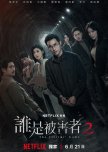
The Victims' Game Season 2
7 personnes ont trouvé cette critique utile
"Some secrets have no room for so many people"
The Victims’ Game brought Fang Yi Ren back for a second helping of pain and murder. This time Fang would find himself the prime suspect when his mentor’s case from 15 years ago was re-opened and the bodies started dropping around him.Fang is called into police HQ by Prosecutor Chang, who is new and takes an immediate dislike to Fang. Another fresh face is Dr. Hsueh, a medical examiner who also has no love for the retired forensics investigator. The case in question involved a teen couple in a murder-suicide which was closed by Fang’s mentor, Lin Ching Jiu. When civilians involved with the old case start dying, Chang is all too willing to point the finger at Fang. Intrepid reporter Hsu Hai Yin quits her job after her boss sensationalizes a teen addict case she worked on. One of the teens in the story ends up at Sevensleeves rehab. Handsome Lin Meng Cheng runs the rehab and home for teenagers from troubled families. When Hai Yin visits, he hires her right away as the foundation's PR rep. Her inquisitive nature tells her there is more to Lin than meets the eye. Fang’s daughter Xiao Meng feels suffocated and not understood by her dad and moves out. She coincidentally ends up living at Sevensleeves. Someone who was familiar with her problems from S1 offers her a job cleaning up crime scenes which leads to insights on her part.
I enjoyed the dynamics between Fang, Hai Yin, and Xiao Meng. Hai Yin and Xiao Meng were so sure that Fang wasn’t trying to understand them that they failed to see they might not have been trying hard enough to understand him. Fang and Xiao Meng struggled to determine if they could build a relationship while Hai Yin was feeling shut out from Fang’s thoughts. Whether Joseph Chang’s portrayal of a man with autism was accurate or not, is not a judgement I’m qualified to render. Chief Chao returned from S1 with his steadfast belief in Fang, a relief since Fang was being bombarded on all sides. I didn’t find the “who done it” part very suspenseful. I was quite certain who killer #1 and serial killer #2 were by the second episode. The heavy-handedness of Prosecutor Chang always trying to bring Fang down got old quick. He was a shady character with connections to an even shadier organization.
Warnings---If you are squeamish, there were numerous gruesome scenes of murder, torture, and decomposed bodies. The body count was high and bloody. Revenge was not a dish served cold but at the average body temperature much of the time. There were also a few gross scenes with insects. Tiffany Hsu’s Hai Yin smoked almost continuously in S1, so if smoking is a trigger you’ll be pleased to know that she didn’t light up once in S2 that I can remember.
The main theme of S2 was “What would a parent sacrifice for their child?” Some of the parents were willing to sacrifice lives, reputations, and peace of mind. As determined characters searched for the truth, others tried desperately to bury it. Despite its shortcoming, I found The Victims’ Game S2 engaging and binge-worthy.
23 June 2024
Cet avis était-il utile?

"This battle is a fight to live for our future"
When I saw the Toho logo my heart jumped with joy knowing Godzilla was back home where he belonged. In Godzilla Minus One he was no longer a comic character playing catch with a giant lobster or the King of the Kaiju restoring balance to the Earth. He was a destroyer and an indictment on humankind’s hubris and a reminder of the horrors of war. If Japan was at level zero after WWII, Gojira put them at minus one when he surfaced from the depths of the ocean with a terrible judgement.Near the end of WWII, Shikishima Koichi is a kamikaze pilot who lands his plane on a small island held by the Japanese ostensibly for engine trouble. It’s not long before the mechanics realize he has run away from the fight. They don’t have long to berate him when they are attacked by a monster the locals call Gojira. When Shikishima freezes once again, he is labeled a coward by the only other survivor. Back home he is reviled by a sister for returning alive, as she blames the country’s problems on his failure. Koichi takes in a woman with an orphaned baby, unable to throw them out when Noriko makes herself at home. The war isn’t over for Koichi as he is paralyzed with regret, guilt and PTSD and unable to move on with his life. When Gojira heads for Japan, the pilot will have a second chance to redeem himself and his honor.
Godzilla Minus One succeeded in two areas. Firstly, they went back to Gojira’s mythology and his evolution from nuclear testing. Gojira was personification of the fear and memory of atomic weapons, something the people of Japan had suffered horrifically from. He was also a punishment for Japan’s militaristic era and the damage done to others and their own people. This monster claimed his territory with a fearsome rage. Capable of regenerating, modern weapons were all but useless against him. Secondly, for one of the first times since the original, there were compelling human characters with interesting stories seamlessly woven into Gojira’s appearance and threat. Too often, the humans were dead weight in Toho’s Gojira films saddled with mediocre actors and dialogue. Koichi was a complicated character and his boat buddies were developed enough to remember them. Noriko as a character was thinly but heroically drawn. Even the characters who reviled Koichi came around to being more well developed.
If there was one flaw, the horrors of the war were laid solely at the government’s feet, which categorically absolved the rank and file from atrocities committed during the war. And yes, the government had the “best ability of spinning and hiding information from the masses”. The government also, “...treated our lives too cheaply...Tanks with insufficient armor, poor supply chains-leading to starvation and disease…and fighter planes without ejection seats…as well as kamikaze and suicide attacks.” The characters emphasized living for their country and its future instead of dying for it even as they bravely faced a seemingly indestructible foe.
For a film made for 15 million dollars (USD), it looked far richer. The special effects were excellent whether it was Gojira’s atomic breath, miniatures, ships, or buildings crumbling like houses made of cards. Gojira himself, was frighteningly majestic and terrifying. Able to regenerate, he did come across as a vengeful god. This film deservedly earned an Oscar for Visual Effects. One last little production note--Sato Naoki is credited as the composer but much of the score was a reworking of Ifukube Akira's iconic Godzilla theme.
Not since the original Godzilla (1954) have I enjoyed a Big G film this much. Gojira was a merciless, destructive force, created by unnaturally splitting atoms. The people of Japan united not to fight to the death against this formidable opponent but to use all of their abilities in a battle that would ensure that they could live for their future. In the face of this harbinger of death, there were those who found redemption, love, and healing. Good job Toho! You made a film worthy of the original and a wonderful way to celebrate Gojira’s 70th anniversary.
2 June 2024
Cet avis était-il utile?

Cette critique peut contenir des spoilers
To live and dye in Taiwan
If you created a weave out of a screwball rom-com and a gangster film with vulgar humor, you might end up with something like Miss Shampoo. Vivian Sung and Daniel Hong certainly gave it their all and they did make a strange but fitting couple. Hair warning, if you are looking for a sweet rom-com of opposites attracting, the humor is quite crude. And yes, there may be a few styling puns plugged in hair and there.On a dark and stormy night, a wounded gangster stumbled into the shop where Fen was a shampooer. She managed to cover for Tai when the assassins barged in searching for him. Tai later returned with enormous gifts and had Fen cut his hair. Soon all the gangsters and those dependent on them were coming into the faltering shop to have her work on them. She was either a visionary or a terrible stylist as the cuts were often vibrant and bizarre. It took nearly half the movie for the two to finally hook up which was actually pretty funny as it included an introduction to her equally odd family. They didn’t have a problem with her dating a “hard working” gangster as long as he didn’t become scary and kill the family if they broke up. The gangster plot included finding the murderer of the previous boss, an urban renewal project with election ramifications, a lieutenant’s dissatisfaction with the direction of the gang, and lopping off fingers-so many fingers.
Daniel Hong was a good sport as was his gangster boss Tai. He wore several hideous wigs, including a bizarre bowl cut mullet, blonde dreadlocks, and a 1990’s ahjumma perm. Vivian Sung made for a perky shampooer with a strange vision for hairstyles. Tai had a soft side and Fen had a wild side which brought the couple closer together until the classic misunderstanding was inserted between them which would take time to straighten out. The uneven humor did have some highlights. There were unspoken dialogues that were quite funny---one between Tai and Fen’s mom and one between Tai and his lieutenant, Long Legs. Some of the humor was too crass for me and there were many crude sexual references. The director didn’t wave away the brutal lifestyle of a gangster and the permanent retirement plan for the bosses. A two-hour run time was also a drawback for this film. Few violent rom-coms can withstand 120 minutes of tangled plot progression. That’s not to say there weren’t entertaining moments and even touching ones because there were when the plot moved at a nice clip. The story even threw in an emotional twist near the end.
Miss Shampoo could be bubbly and bloody, hairlarious and cringe-worthy. The lovers both dealt with living on the fringe of society, unable to move ahead socially. While the movie gave supporting characters memorable moments it was too long and was in dire need of a cut. If you don’t mind lewd humor braided into a romance with a side of bobbed fingers this might be a movie worth giving a curl.
28 Dec 2023
Cet avis était-il utile?

Cette critique peut contenir des spoilers
"Sis, daringly keep going ahead"
Red Sorghum was the film that launched Zhang Yi Mou's and Gong Li's careers. For his directorial debut, Zhang's movie won many awards including the Berlin IFF's Golden Bear Award for Best Picture. Saturated in deep colors and textures and accompanied by music that fit every scene perfectly, this 1987 film showed what the world was in for with his mesmerizing style of moviemaking.A radiant 22-year-old Gong Li played Jui/Grandma, a bride being carried along in a palanquin to be married to a 50-year-old man with leprosy. Jiang Wen as Yu/Grandpa was the expert carrier. The men sang a bawdy song of her fate as a young "ugly" bride marrying an old leper. As she bounced up and down in the small litter you could feel her nausea growing. When they reached the wild red sorghum fields a bandit attacks the group, but the men are not so meek as to let him take the bride into the fields. After the wedding she is allowed to return home with a donkey as a wedding gift/payment to her father. Along the way she is once again set upon, this time alone, and Jui runs frantically through the wind driven sorghum chased by her assailant. The masked man turns out to be Yu. He stomps the sorghum down into a verdant bed with all the gentleness of a wild beast. It was difficult to tell whether Jui initially gave her consent, I hope so, because afterwards, she fell in love with Yu. On her return to her legal husband, she's told he was murdered by an unknown killer. The workers prepare to leave but she convinces them to stay in a profit-sharing business. A drunken Yu shows up and she kicks him out. She's kidnapped for ransom by other bandits. After her return, Yu pees into the wine crocks as if marking his territory and carries her off like a sack of potatoes. Instead of ruining the drink, it is now transformed into an exquisite elixir and business booms.
Yu was often portrayed as a primitive male, dirty and brash, and Jui rarely called him on it. Thank goodness, Zhang displayed a more favorable view of women in future films. It was also a credit to Jiang's performance that Yu was considered even somewhat likeable. With the exception of her relationship with Yu, Jui came across as a competent and independent woman.
Jui gives birth to Yu's son and all seems well. It's a magical winery where anything can happen. Life is often lusty and humor filled. Then the movie switches from How I Met Your Mother to The Deer Hunter. The Japanese invade the peaceful village and one of the villagers is flayed. The film ends in a blood bath, as if everyone had gone swimming in a vat of the red sorghum drink under an eclipse. ***
I am a big fan of Zhang Yi Mou's style. His movies are luscious to drink in, the lighting, sets, costumes, and props are all feasts for the eyes and this one was no exception. I would really like to have a set of the drinking pottery, they were beautiful. Few people can capitalize on scenery as he does, color-soaked fields and skies were suitable for framing. A young Gong Li already exuded the power and sensuousness of a grown woman. Her character took over the winery, mothered a child, and called men to battle quite believably. With a running time under 90 minutes, the characters were not well developed, we know little about them except what we see on the screen. Gong Li's and Jiang Wen's exceptional performances helped me to overlook some narrative issues. The change in mood was abrupt and jarring when the shocking violence erupted, I suppose much like in real life when horror and tragedy hit out of the blue.
Red Sorghum showed the fierce tenacity of the rural people in northern China as they faced a variety of adversities and most times were able to create victory and song out of difficult situations. The film was imperfect, but very much worth the effort to experience the premiere stunning collaboration of Zhang Yi Mou and Gong Li, one of the best partnerships in filmdom.
6/30/23
*** A word of warning, there were disturbing scenes. Animals being butchered and skinned were shown up close as well as the human flaying which I could not watch. There were two urination scenes as well. And depending on how you interpret it, a possible rape.
Cet avis était-il utile?
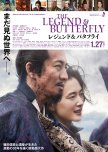
The Legend and Butterfly
7 personnes ont trouvé cette critique utile
Cette critique peut contenir des spoilers
A kill or be killed world and love
When a film begins with a traditional marriage where the bride wants to murder the groom on their wedding night you are left with the question, "Which one is the The Legend and which one is the Butterfly?" A political marriage of the uncouth Fool of Owari and the cunning Viper's Daughter made for an explosive and potent combination.The story was a reimagining of Oda Nobunaga and Nohime's marriage as little was known about it. Historically, she was thought to be beautiful, intelligent, and skilled with a blade. In this version of the life story of the first "Great Unifier" of Japan, she was the genius and fire behind the man.
Nobunaga and Nohime clashed, sometimes violently, in early scenes in the film. The story takes place over thirty years, giving short amounts of time to major events in their lives, usually converging with battles for power outside of the marriage. Eventually, they come to a place outside of Nohime's role as a spy for her father and her infertility where they could move beyond tolerance and reluctant admiration to love. But true love rarely flows smoothly with pride, vengeance, and illness creating problems.
Kimura Takuya was able to portray Nobunaga's carefree and coarse youth with buddies outside of his caste. He also conveyed the weight of the battles and familiar lives lost, showing the transformation from the Fool of Owari into the Demon King capable of ordering women and children to be killed. Ayase Haruka transcended many of her drama roles as the tough as nails and brilliant strategist, Nohime. I was saddened as her role diminished once she fell in love and yet she still wrung as much out of Nohime's shadow as she could.
The gorgeous sets, elaborate costumes, music, and cinematography were all well done. It would be hard to fault unless there were some anachronisms involved. I am not well versed in the history of this era so I can only comment on the entertainment value of the film for an outsider. While I enjoyed the fast-track history lesson, the romance between Nobunaga and Nohime was difficult to comprehend as both held their emotions close to their vests. They only allowed their true feelings to show a couple of times. It could be hard to keep up with their emotional "growth" because of the constant short time jumps and quick changes in attitudes as Nobunaga strengthened his resolve to kill everyone who opposed him and she softened desiring a normal life with him more and more. As much as I wanted to care about the two, it was difficult to emotionally connect to them and their conflicts. Perhaps this would have worked better as a short drama so that their personality changes could have been delved into more and not be seen as so abrupt.
The Legend and Butterfly was entertaining even if it lacked the emotional depth I was looking for between the spouses. Regardless of historical accuracy, it was refreshing to see Nohime shown as a capable and intelligent woman, a wife Nobunaga could turn to for sound advice. Whether Nobunaga was a Fool or a Demon, neither, or a little of both is for people far more educated on the subject than me to comment on. As a film, a nearly 3 hour film covering 3 decades, focusing on the marital harmony and disharmony of one of Japan's most famous historical figures, The Legend and Butterfly succeeded largely on the likeability and skills of the performers. It was a kill or be killed world and for a time, marriage.
5/19/23
Cet avis était-il utile?
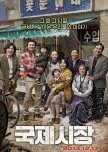
Cette critique peut contenir des spoilers
"Put the family first!"
Cue the violins and bring out the box of tissues because Ode to My Father will shamelessly and successfully pull at your heartstrings. This film is not only an ode to one father, but two, as you follow a boy from childhood to old age selflessly working to provide for and keep his family together just as he had promised his father he would do.The film follows Deok Su as a child in 1950 fleeing Hungnam as the Chinese were overrunning the city. His only task was to hold his little sister's hand as the family sought shelter on a US ship, the USS Meredith, accepting refugees. In the stampede to find a way onto the ship, his sister was lost. When his father turned back to find her, he tasked Deok Su to be the man of the family and always put the family first if he could not return. Deok Su took his promise seriously when they arrived at his aunt's shop in Busan. Accompanying him on his various entrepreneur ventures was his best friend, Dal Gu.
Deok Su would later go to Germany to be a coal miner, a dark and dangerous job, in order to pay for his brother and sister's schooling. There he would meet his future wife, a Korean woman studying to be a nurse, Young Ja. He and Dal Gu returned home when the Germans stopped renewing their work visas. After his aunt's death, his uncle wanted to sell the Kkotbun Shop. Once again, Deok Su stepped forward, this time taking Dal Gu with him to Vietnam to earn money as "technicians". The two friends would face the same choice the Americans did at the North Korean port when as they were fleeing Saigon women and children begged for them to let them onto their boat. In 1983 Deok Su and Dal Gu would go to Seoul in the hopes of finding his father and sister when the Korean Broadcasting Services showed families being reunited through their programs.
Deok Su's grown children cannot understand why he won't sell his shop or change the old-fashioned name. Deok Su who so easily sacrificed his own dreams and took dangerous jobs to provide for his family, privately confessed to his father's image how difficult the struggle had been. After promising his father he would always put the family first, the last words he heard his father speak were that he would meet them at the Kkotbun Shop. Never saying his purpose aloud, Deok Su kept the shop open in case his father survived so that he could find his way to them.
This was a nostalgic look back for older Koreans who after surviving the Japanese occupation were devastated by the Korean War. Their country divided and some families divided by the new boundaries, dealing with political and economic upheavals, mothers and fathers worked hard to feed and shelter their families among the continuing changes around them. The main character in this film shined shoes, dug coal, traveled to Vietnam during that war, and later ran the family shop. He did all this to make things easier for his family and children. In a letter to his wife, he told her how grateful he was that it was he that suffered and not his children. And of course, his children, as children are wont to do, did not fully understand the hardships and struggles their parents went through for them.
Lest you think it was all melodrama, fear not for there were gentle moments of humor that lightened the mood. As much as the film was about family and sacrifice it was also about friendship. It was heartwarming to watch Deok Su and Dal Gu stand by each other from childhood to old age.
A small historical note: The USS Meredith was credited with one of the largest humanitarian rescues when the ship dumped its cargo and took on 14,000 refugees in a ship designed for 12 passengers and 47 crew.
I am not a crier, but this movie moved me to tears on several occasions. I knew the director and music director were setting me up for the big emotional moments and did everything but present a cue card that said, "Cry now!" It didn't matter, the milestones in this film though far removed from my life still reminded me of the sacrifices and relentless hard work my parents and grandparents went through to make my life easier. And like the director, who made this film as a thank you to his father, it reminded me to say thank you to those who went before me. The desperation during times of political upheaval for people who have nowhere else to run is truly heartbreaking. I cried for the families around the world who have been separated by war, death, and poverty and felt gratitude for the ones left behind who have fought tenaciously to hold the survivors together and refused (and still refuse) to give up.
The film could swell emotionally and had an ambitious overview. It helped that the acting was on point and didn't boil over into being overwrought which kept the characters grounded. With all of the time jumps it could have been easy to become lost as we were given a personal tour by Deok Su through pivotal points in Korean history. Though the story covered decades and several countries, Ode to My Father was at its heart a simple and intimate story of a man keeping a promise to his father. Unabashedly melodramatic? At times. But this film was also inspiring and uplifting and a lesson in the power of tenacity. If you are looking for a movie to touch you, look no further.
4/24/23
Cet avis était-il utile?

Cette critique peut contenir des spoilers
"Tastes of life"
My Wiggly Friend takes viewers on a taste tour of rice noodles in China. The documentary covered different dishes as well as the devoted chefs who lovingly prepared them. Each short episode focused on three different restaurants from three different regions. First developed in Jiangxi 1800 years ago, Jiangxi alone produces more than 1.4 metric tons of rice noodles a year! Suffice to say this documentary only opened the door to a wider array of noodle creations.Episode 1 covered Sour Noodles made by a bad-tempered chef with tomatoes that had been fermented for a year. The dish was garnished with Litsea oil. In another city, two brothers created River Snail Rice Noodles with pickled bamboo shoots. The draw for customers was the "stinky" aroma. I'm not sure if it was a bad translation but the narrator called the pickled bamboo shoots a "biochemical weapon." At the last place, an older couple made Old Friend Rice Noodles out of pork and chicken, fermented black soybeans, and fermented bamboo shoots. The "stinky" soup was said to make you "sweaty and full". All of the dishes were described as strange which could have been a subbing problem.
Episode 2 began with truck drivers stopping at a 24-hour truck stop where Mutton Rice Noodles were served by a mother and daughter. The soup began with a goat skeleton being used to make the broth. Scalding Rice Noodles was the next stop with father and son chefs. They were known for their spicy tripe noodles. The father tested his son's ability to make Rice Noodles with Eel Gravy before agreeing to hand the restaurant over to him. Finally, Termite Mushroom and Chicken Rice Noodles was cooked by an older chef for his wife using his family's traditional method of slow cooking it in a wooden chest.
Episode 3 began with a family famed for their Lard Stirred Noodles made with lard extracted from pork belly. Next a bickering mother-in-law and daughter-in-law sold Spicy Noodles out of their food truck to hungry office workers. Lastly, was the bland but strong Brine Soaked Noodles with crispy pork and pickled string beans described as something of which you "cant dodge the strong smell".
Episode 4 was for the more adventurous as it featured a small breakfast shop in a market across from an open-air butcher. The sour and bitter soup was made using cow intestines with the digested grass still inside-Beef Sapei Noodles. It was accompanied by fried beef skin. From turf to surf, the next culinary adventure was Seafood Rice Noodles made with fresh seafood and sand worms. The last stop in the episode was food from the mud-Cattail Root Rice Noodles made from Cattail roots and jellied pork blood.
Episode 5 explored different shaped rice noodles. The first up was a dish made by a rice roll master who filled Cloth Rice Rolls with meet or eggs, like one might a crepe or burrito. Stop 2 featured Diamond Rice Stir Fry and also a beef bone soup with rice lumps. The final visit was to a place where the chef made Duck Soup with Rice Pellets. Said to have a mild flavor, it was good for children and older people because it required little chewing.
Most of the restaurants shown were run by families or friends and had been in business from 20-50 years. Some of the people gave back by teaching a new generation the old techniques. The people running the businesses and cooking, like hard working people in the food industry everywhere, worked long hours. They were all doing something they loved and found rewarding, but it was time consuming. The documentary could be heavy-handed with the older couples being romantic and glossing over the families where the children of the busy owners missed out on attention. I did feel bad for the son being tested on the eel rice noodle dish. He'd been cooking since he was twenty and it took his elderly father over twenty-five years to give him a compliment!
I can't say that the majority of dishes made my mouth water but I'm fascinated with what people eat and how they prepare the dishes. It was also interesting how different places utilized the local food sources whether it was termite mushrooms or sand worms. The photography was skillful during the food preparation scenes and also gave glimpses into the varied cities and villages. Word of warning: if you are a vegan or squeamish you may want to avoid this show as there were butchering scenes and numerous animal prep scenes.
I enjoyed the insight into the creative and dedicated cooks who not only worked to keep traditions alive but innovated as well. If you enjoy food documentaries, this ode to China's love affair with rice noodles would be worth a try.
"Those who work hard definitely have some good luck."
3/25/23
Cet avis était-il utile?

 55
55 202
202 11
11






















